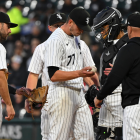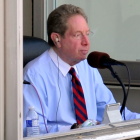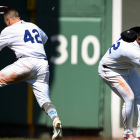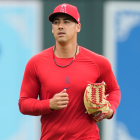At some point this weekend, Oregon State will begin its baseball season with an admitted child molester on the mound.
Luke Heimlich is in the Beavers' rotation the same way he was last June when The Oregonian broke the story that one of the nation's best pitchers had pleaded guilty to a count of felony child molestation.
At age 15, Heimlich molested a 6-year-old female relative, according to the report. While Heimlich reportedly denied the allegations, he still pleaded guilty, preferring to avoid a trial.
His probation is over. The case was sealed in August after a five-year period. Amazingly, he is still on the team.
A big reason we know any of this is the state of Washington, where the crime occurred, doesn't necessarily seal juvenile files. Thank goodness. It was only after digging last year by The Oregonian that these questions became relevant …
- When did the school and coach Pat Casey know of Heimlich's crime?
- Did Heimlich and his family conceal his situation from the school and Casey when pursuing a scholarship?
- Upon revelation of his situation, why wasn't Heimlich suspended/kicked off the team?
- And why, eight months later -- after ultimately removing himself from the lineup last postseason -- is he still on the team?
Everybody deserves a second chance, but in any rational society there is a line that can't be crossed. Heimlich's admitted actions are intolerable, heinous. His privileged presence on the mound mocks every victim of sexual violence.
I'm not saying he shouldn't be in school -- somewhere. It's the same argument that haunted Oklahoma when it enabled Joe Mixon. The tailback was suspended for a year but still allowed to complete his career after punching a woman.
Oklahoma should stand for something better than that. One would hope Oregon State does, too.
I'm agreeing with my friend Brenda Tracy, an activist and rape victim.
I don’t think athletes with sexually violent histories and criminal/felony records should get to play sports. Period.
— Brenda Tracy (@brendatracy24) February 14, 2018
If you have a problem with that then you are the problem.
Some administrator somewhere has to take a stand. Athletes with sexually violent histories simply should not be allowed to play college sports. It's possible. Indiana and Utah have such bans at their schools. The SEC and Pac-12 ban transfers with "serious misconduct" in their backgrounds.
Playing sports is a privilege, not a right -- and certainly not a legal volleyball to be batted around.
When I asked one Power Five athletic director about kicking Heimlich off the team, he portrayed the situation to me this way.
"I'm sure [Oregon State's] looking at him saying, 'We're going to get sued because he'd done his penance.' I would rather get sued by him."
And as long as we're asking pointed questions, here are a couple of others …
- If Heimlich were a low-level walk-on, would he still have a spot on the team?
- If you were absolutely innocent -- as Heimlich contended, according to reports -- how many of you would plead guilty to felony child molestation simply to avoid trial?
Thought so.
Casey did not respond to a request for comment. A spokesman for Oregon State president Ed Ray said he "is not available for Luke Heimlich questions." The spokesman resent to CBS Sports a statement by Ray released last June.
In it, Ray supported Heimlich, "rejoining the baseball team next season." He also hinted "admission criteria" could be revisited beginning this fall. That's too late for the victim who must endure Heimlich's notoriety and success. Reports say she is 12 now.
Ray is hard to figure out. As chair of the NCAA Executive Committee, he admitted to not reading the Freeh Report, the basis for those crippling penalties at Penn State. In 2015, Ray advocated for that Pac-12 transfer ban. It seems beyond hypocritical, then, he has a sex offender on his baseball team.
I reached out to three FBS athletic directors to get their anonymous takes. I asked them: Would Luke Heimlich be on your team under these circumstances right now?
Athletic director A said, "[I] cannot imagine playing him."
Athletic director B said, "Hell no, but these days it doesn't seem that easy."
As the Power Five AD mentioned earlier, athletic director B brought up the possibility of a lawsuit by Heimlich. That would scare everyone in administration. But so should having an admitted sex offender in your midst.
Or should we be surprised at all? Oregon State doesn't ban felons from competing as athletes. Neither does the NCAA.
"Everybody, most of the time, deserves a second chance. I get that," athletic director B said. "[Heimlich] went through his counseling, but it was a 6-year-old child … You've got little girls coming to your games. You can't have that as an image with your program with Larry Nassar and all those things going on. Really?
"You just have to say, 'I'm sorry, young man, you can't play for us.'"
That last sentence is where all this has to change. Heimlich had his due process. His victim will have to live with his admitted actions for the rest of her life. It remains disgusting Heimlich had to remove himself from the NCAA Baseball Tournament last year not wanting to be a "distraction."
What's changed now that he is back?
Heimlich, the Pac-12 Pitcher of the Year, went undrafted. He had been projected as a first-round pick. Major League Baseball spoke volumes without saying a word.
If somehow Heimlich thinks the whole thing will blow over by this June's draft, that's misguided, too. This will follow Heimlich wherever he goes for the rest of his life. As it should.
You think he won't be a distraction now over a full season, traveling across the country with one of the nation's best college programs?
Get ready for ugly chants from the stands. Get ready for more columns like this one wherever Oregon State plays. Get ready for one of the more distasteful College World Series in memory if Oregon State qualifies again with Heimlich pitching.
As for now … play ball?






















